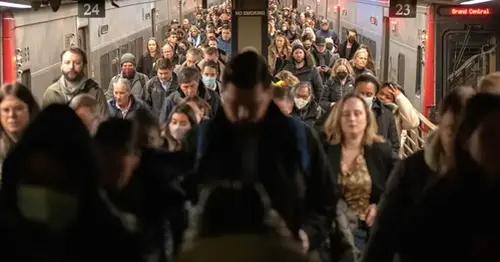
Most Americans just aren't into their jobs, new Gallup data shows
As Americans enter the third year of the pandemic, most workers just aren't into their jobs, with nearly three-fourths saying they're either not engaged or are actively disengaged at work, according to new Gallup data released Wednesday.
The findings, which classify 50% of respondents as not engaged and another 18% as actively disengaged, come as employees increasingly feel their workplaces are abandoning the flexibility and empathy that characterized many pandemic-era workplaces.
"When the pandemic first hit, engagement peaked, people feeling their organization cares about their well-being peaked, so there was a really nice response from organizations early on — and since then, its dropped off significantly," said Jim Harter, chief scientist for workplace management practice at Gallup and the author of the new report.
Only 32% of American workers said they were engaged at work last year, down from an all-time high of 36% in 2020 and 34% in 2021, the data shows. (Gallup has been formally tracking employee engagement since 2000, Harter said.)
And as engagement decreased, the percentage of workers who are actively disengaged increased — from 14% in 2020, to 16% in 2021 and to 18% last year.
Workers who are actively disengaged "are disgruntled and disloyal because most of their workplace needs are unmet," according to Gallup.
What is 'quiet quitting'? Inside the viral trend sparking controversy
Aug. 15, 202203:56The rate of people who classify themselves as not engaged — more recently known as "quiet quitters" — has stayed stable, at 50%, since 2020, down from 52% in 2019. These workers "are getting some of their workplace needs met, but not very many, and they're more likely to show up to work to do the minimum required and not much else," Harter said.
The research firm measures engagement by asking questions about productivity, well-being, workplace environment and values and opportunities for growth, among others. The new report is based on the average results of random quarterly surveys completed last year by about 15,000 adults employed full-time and part-time.
The categories in which workers saw the largest decreases in engagement last year compared to 2019 were in connection to the mission or purpose of the company, opportunities to learn and grow, clarity of expectations and feeling cared about at work.
Health care workers were the hardest hit among the four types of job included in the survey — which also included production/front-line workers, white collar workers, and administrative/clerical workers — facing a 7% decrease in engagement and a 6% increase in "quiet quitting" last year compared to 2019.
Women saw a 4% drop in engagement last year compared to 2019 and a 3% increase in active disengagement over the same period, compared to only 1% differences in both categories for men.
Younger workers also saw particular drop-offs in engagement compared to older workers, with 4% negative changes in both engagement and active disengagement last year compared to 2019, while workers over 35 only saw 1 - 2% differences in those categories between those two years.
Both women and younger workers value freedom and autonomy in the workplace, Harter said. In the case with women, it's because they're often saddled with more caretaking responsibilities than men. With younger workers, it's because they see "more of a separation between worker and workplace."
Research also shows that both groups benefit from mentorship: women due to the pay gap and other biases in the workplace, and younger people because they're just starting out in their careers. But both women and young workers reported steeper declines in feeling cared about at work and having someone who encourages their development compared to their male and older counterparts, respectively.
To combat this disengagement among workers, Harter said, the "leadership needs to define what kind of culture they want going forward and how where people work fits into that culture."
That culture should include regular weekly check-ins between managers and employees to discuss goals, successes, priorities and teamwork, he said: "Organizations need to think of managers more like coaches right now than delegators."
The data suggests that culture should also include some element of a flexible workplace. Workers who were forced to work in-person but could work remotely saw the biggest decreases in engagement, with a 7% increase in active disengagement last year compared to 2019 and a 5% decrease in engagement.
Workers who were fully remote, on the other hand, saw a small increase in engagement and a decrease in disengagement, but a 4% increase in "quiet quitting," with 50% characterizing themselves as not engaged compared to 46% in 2019. Hybrid workers saw 2% increases in both active disengagement and "quiet quitting," and a 4% drop in engagement.
Hybrid workplaces can be especially important for young workers, who need mentorship, Harter said, and it can add "a nice blend of autonomy and in-person time if it's coordinated the right way."







